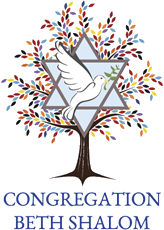Moving has some very big up-sides, and some very big down-sides. Schlepping boxes of files – OMG! And looking at notes from years ago – maybe not all that bad.
Shabbat on June 20th will be Parshat Korach, where we read from the Torah about Korach’s rebellion against Moses and Aaron and his subsequent demise. From a modern perspective, this section has raised a great deal of interest, because much of what Korach says is absolutely correct. He argues that since all of Israel is a Holy People and since God resides among us all, how dare Moses and Aaron raise themselves over everyone else? Is not this what Judaism teaches — even to the extent that some Sephardic congregations do Tefillah from floor level and only read the Torah from the bimah, not wanting to give the impression that ANYONE’S prayers are more important than ANYONE ELSE’S?
Rabbi Joseph Soloveitchik (The Rav), the founder of the Modern Orthodox Movement, explains where Korach’s mistake was by eluding to three different covenants. The Noah Covenant is the obligations incumbent upon all people, Jewish or not. The Covenant with Abraham is what formed the Jewish People and instructs us of a further level of obligations. But according to the Rav, there is a third covenant, the Brit Gadol — the Great Covenant. This is when one not only accepts the other obligations, but further accepts the obligation to be God’s partner in Tikkun Olam, in the healing of the world. Soloveitchik points out that one can be part of the Jewish People and accept the Covenant of Abraham without actually DOING much, if anything. The individual who has accepted the Brit Gadol must work to make this world suitable for the Messianic Age.
Soloveitchik’s point: Korach was wrong. We are not all equal, not all at the same spiritual level. Korach is saying, “You are all unique”, and The Rav adds, “Just like everyone else.”
I bring this up (and the unpacking) because I just found notes from 2009 when the Jewish Outreach Institute held its North American Conference in Philadelphia. For those who don’t know of the JOI, it is the leading organization addressing the challenge of getting Jews who are not part of the Jewish Community, who feel alienated from the Jewish Community, to return, as it were, to the fold. The JOI truly believes that with the expanding diversity of today’s Jewish Community, the notions of “who is in” and “who is out” must change. There is an incredible number of intermarried families, adult children of intermarriage, multi-racial and LGBT Jews who feel they are on the periphery of the Jewish Community. This is an incredible resource which, especially at this time, the Jewish Community can ill afford to waste.
One of the highlights of the conference was the talk by Rabbi Irwin Kula, Director of CLAL (The National Jewish Center for Learning and Leadership). Rabbi Kula criticized the use of terms like “affiliated” and “intermarried”. Rabbi Kula stated that Judaism itself believes there is no one correct way to be a Jew, and when we use that type of terminology, we create “artificial barriers that don’t exist”. Instead, we should image a Jewish world where “there are no boundaries”.
Not surprisingly, his remarks triggered a great deal of dissention and debate — so much of what he said just seemed so right, and so much of what he said just seemed so wrong A Jewish Community closed to Jews — NEVER! A Jewish Community with no boundaries — NEVER! But then again, why should we expect agreement on something as important and challenging as preserving our future?
Though Rabbi Kula used very different language, he was asking the same question that Rabbi Soloveitchik asked. The Rav asked, “What is the difference between someone who is a part of the Covenant of Abraham and someone who is a part of the Brit Gadol?” JOI asked, “What is the difference between the Jew who is ’in’ and the Jew who is ’out’ — and shouldn’t all Jews be ’in’?”
B’Shalom
Rabbi Stanley Halpern
